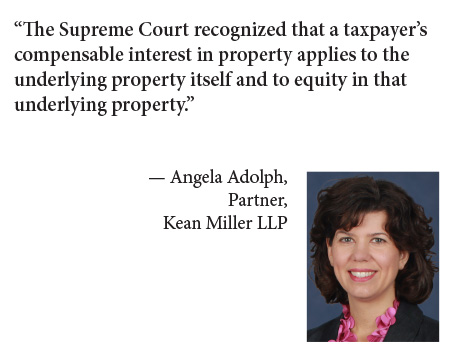By Angela Adolph, Esq. of Kean Miller LLP
Federal courts rarely adjudicate property tax matters, which have traditionally been the province of state courts.
In May 2023, however, the U. S. Supreme Court issued a unanimous decision in a case that squared state property tax law up against the Fifth Amendment takings clause, which prohibits taking private property for public use without just compensation.
Taken for taxes
The events leading to Tyler vs. Hennepin County began in 1999, when Geraldine Tyler purchased a Minneapolis condominium that she occupied until she moved into a seniors housing community in 2010. Tyler retained ownership of the condominium but failed to pay property taxes on it for several years, resulting in approximately $2,300 in unpaid taxes and $13,000 in interest and penalties.
Acting in accordance with Minnesota tax forfeiture procedures, Hennepin County seized the condominium and sold it for $40,000. This extinguished Ms. Tyler’s $15,000 tax debt, and Hennepin County kept the remaining $25,000.
Minnesota’s tax forfeiture procedure required the county to give the delinquent taxpayer adequate notice of the tax sale; notably, the procedure lacked a mechanism for a delinquent taxpayer to assert a claim to any sale proceeds remaining after paying off the tax debt.
Tyler brought a putative class action suit against Hennepin County in Minnesota federal court alleging that Hennepin County’s retention of $25,000 in excess proceeds from the sale of her condominium was a taking of property without just compensation, and therefore an unconstitutional violation of the takings clause. The lower courts rejected her claims, and the case made its way to the U.S. Supreme Court.
The Supreme Court first noted that the takings clause does not itself define private property which, if taken by a state, requires compensation. The Court then conducted a thorough analysis of historical practice and traditional property law principles to determine that the surplus value remaining after a forfeiture sale constituted compensable property under the takings clause.
The Court concluded that the right to surplus proceeds is simply an extension of the corresponding interest in the underlying property. Thus, the Court recognized that a taxpayer’s compensable interest in property applies to the underlying property itself and to equity in that underlying property in the form of excess proceeds generated from a forfeiture sale of that property.
Accordingly, while Hennepin County had the power to sell Tyler’s home to recover the unpaid property taxes, it could not use the tax debt “as a toehold” to confiscate more property than was due, the Court stated. Doing so effected a “classic taking in which the government directly appropriates private property for its own use,” such that Tyler was entitled to just compensation from Hennepin County.
Mechanisms mandate?
Unfortunately, the Supreme Court’s recognizing a property right in surplus proceeds does not mean that states must now automatically return surplus proceeds to delinquent taxpayers. Nor does it directly address how states should administer their tax forfeiture sales to prevent infringing on taxpayers’ constitutional rights.
But the Court did give some guidance in Tyler as to what statutory measures might prevent a takings clause violation. The Court cited Nelson vs. City of New York, decided in 1956, in which the city foreclosed on properties for unpaid water bills. Under the applicable ordinance, the aggrieved property owners had an opportunity to request the surplus from any sale by filing a timely answer in the foreclosure proceedings asserting that the properties had a value exceeding the amount due.
The property owners failed to do so, however. The Supreme Court held that, because the owners did not take advantage of this procedure, they forfeited their right to the surplus. Because the ordinance did not absolutely preclude an owner from obtaining the proceeds from a judicial sale but simply defined the process through which an owner could claim the surplus, there was no takings clause violation.
States are already reacting to the Tyler decision. In New Jersey and Virginia, courts have struck down state court tax sale procedures as unconstitutional under Tyler. Nebraska has amended its tax sale statutes to conform with Tyler.
Louisiana is following suit: Under current law, a tax sale grants the purchaser a prospective ownership interest in the form of a tax lien. This lien represents a claim on the property but does not confer immediate ownership rights. The purchaser can acquire full ownership after the redemption period has passed.
After Tyler, the Louisiana Legislature proposed amending the state’s constitution to require adding to the state’s tax sale procedures a process for delinquent taxpayers to claim any excess proceeds from a tax sale. The measure must be approved by the electorate and is on the December ballot for voter consideration.
Chief Justice John Roberts noted in Tyler that a taxpayer must render unto Caesar what is Caesar’s, but no more. While states are conforming their laws to Tyler, taxpayers and aggrieved property owners must still comply with governing statutory procedures to claim their surplus and prevent Caesar from getting more than he is entitled to.
— Angela Adolph is a partner in the Baton Rouge office of Kean Miller LLP. The firm is the Louisiana member of American Property Tax Counsel, the national affiliation of property tax attorneys. Contact her at angela.adolph@keanmiller.com.


